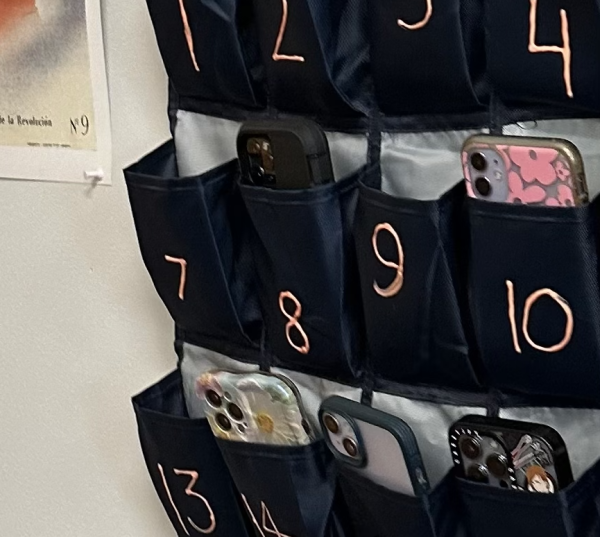
Sage Hill opened its gates with a twist to the Class of 2028 on Aug. 19. The school introduced a new cell phone policy on campus: freshmen students must turn off their phones and put them in designated holders before the start of each class. This change shocked many students within the Sage Hill community, as a grade-level phone restriction has never been implemented before.
Elected officials and school administrators believe cell phones have left a damaging impact on children, and that phone policies restricting usage may help children better focus and give them the opportunity to learn without outside distractions.
States and school districts across the nation have rapidly adopted policies banning the use of cellphones in schools, with restrictions differing from state to state. Last month Gov. Gavin Newsom signed a bill requiring public schools’ boards to ban or limit the use of phones on their campuses by July 1, 2026.
But does Sage Hill really need this phone ban? From our common observation, Sage Hill rarely has an issue with in-class cell-phone use. More likely, students use their laptops to be off-task instead. The root of the problem is that technology is irrevocably integrated into our lives, and banning phones is akin to putting a band-aid over an internal injury. Teens raised with technology must eventually learn concentration and self-control despite the relentless bombardment of stimuli, and harness their most utilized devices for productive purposes.
This phone ban would make more sense for elementary or middle schools. However, in high school, students should be gaining the life skills they need for successful careers in the future–including productive technology use. Though some argue phones have no place in an educational environment, it’s precisely because schools are educational that they should be addressing and integrating phones into the system. Expecting parents and family to teach this skill at home is unreliable and irresponsible, especially when caretakers themselves may not fully understand how to do so. Schools have the resources to reliably and universally teach kids to use their phones as tools rather than entertainment devices. Perhaps, it’s time for Sage Hill to consider adding new courses or programs, similar to financial literacy or “Wellness Wednesdays.” They could specialize in teaching students how to harness the power of technology and different organizational softwares with high learning curves, such as Obsidian.
Whether or not the phone ban will be permanent, or even extended to higher grade levels is up to debate. Some Sage Hill teachers believe the idea of the phone ban is to get freshmen used to the new reality of high school. The majority of a dozen freshmen The Bolt interviewed expressed little concern with the phone ban, citing similar rules at their former middle schools. So while some may find the ban restrictive and strange, most freshmen seem to be taking it in stride. Ultimately, the results of this year’s freshmen will have to show for themselves.




